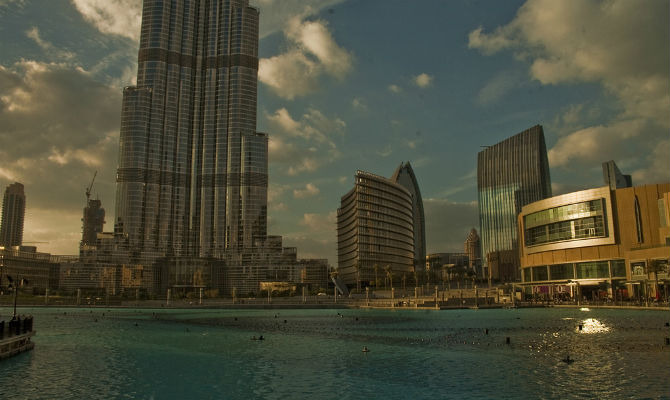Dubai's Qbara Sets The Pace For Modern Arabian Cuisine
What do Alain Ducasse, Gordon Ramsay, Gary Rhodes, Pierre Gagnaire, Atul Kochhar, Yannick Alléno, and Giorgio Locatelli have in common? They are all Michelin-starred chefs (some with over a dozen stars) that have expanded their empires to Dubai in the United Arab Emirates. While tardy Michelin has not arrived there yet, the presence of so many of its honorees gives one a feeling of how sophisticated the restaurant scene has become in what was, as recently as 25 years ago, a sleepy fishing village on the Arabian Gulf.
Arriving at the automatic glass door at Qbara, Time Out Dubai's "Best Newcomer 2014," is just like pulling up at a high-concept domestic restaurant. Inside, the design is impeccable. Top Japanese restaurant designer Studio Glitt has created a world class interior. Staff uniforms are by top local designer Essa. Downstairs is an exotic lounge with elevated seating.
The menu is not composed of strictly traditional Arabic cuisine. Rather, paralleling modern cosmopolitan Dubai itself, it's inspired by Arabian food culture. In Qbara's case, that tradition is refracted through the lens of Group Director of Culinary Emiliano Bernasconi and Qbara executive chef Colin Clague. The result is a modernist take on Arabian flavors presented with items familiar in Western cuisine.
We went with the early dinner option at AED 245 ($90) for 11 courses. The first course was a take on the traditional raw vegetables and labneh dip combination, the latter being infused with truffles and delicious. The bread basket was a combination of baguettes and Middle Eastern flatbreads. Next was a fattoush salad with avocado, lemon, and mint dressing, all sprinkled with sumac. This was the first of a series of dishes served in deep off-center bowls that offered a stylish touch to the proceedings. A crudo of yellowtail sprinkled with coriander seeds was all gussied up with edible flowers, and crisply fried calamari with home-pickled chili mayonnaise was a welcome addition to the meal. The highlight of the experience was kibbeh, but stuffed with lobster instead of the usual ground beef or lamb. Served with fresh herbs accompanied by avocado labneh, this was a very flashy take on a Levantine favorite.
The final trio of dishes were the "heavyweights." A spicy grilled salmon with Moroccan tomato jam offered a new take on a popular fish. Grilled lamb cutlets were spiced up with Maillard reaction-induced flavors. The ever present labneh was flavored with mint in this instance. Afterwards, we concluded with the signature dessert, a sweet milk b'stilla with strawberries.
Our waiter and sommelier (both Ukrainians) were consummate professionals throughout. I expect they found the temperature of 100 degrees Fahrenheit in Dubai more comfortable than the low-level war taking place back home.
A word on the wine list: it is as good as that of a Michelin-starred restaurant in Europe. It is also well-constructed, with selections drawn from all over the world. However, a combination of logistics and tightly regulated liquor supply markets makes prices high. I paid $20 for a glass of 2013 Sancerre from Doudeau Leger and a similar amount for a 2014 Grenache Blanc from Gayda. My red by the glass was my first Turkish wine, 2012 Öküzgözü, Kaya Kapadokia, a full-bodied red with a dark fruit and chocolate nose that would be hard to place in a blind tasting but proved well-made and a good foil for the grilled lamb chops.
What had been a virtually empty room when we entered at 7:20 p.m. was packed by the time we left at 10:30 p.m. The clientele were an eclectic mix of Westerners (tourists or expat workers) and Arabs. A group of Arab men in their 20s sang happy birthday to one of their number (in English) but toasted with non-alcoholic fruit-based drinks (which tend to get very elaborate).
Qbara gave us a deeper respect for the cuisine of this fascinating region of the world.
Note: We paid for our meal and dined anonymously.
